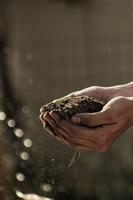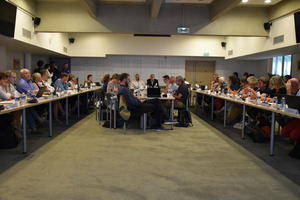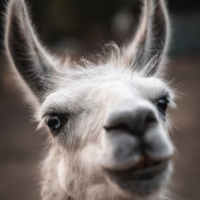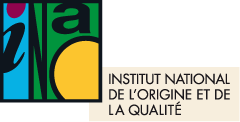Everything you need to know about organic farming
Organic agriculture (AB) is a production method that combines optimal environmental practices, respect for biodiversity, preservation of natural resources and assurance of a high level of animal welfare.
How to recognize an organic product
To recognize an organic product, rely on two markers: the Eurofeuille, the European organic logo, and the AB mark. These logos are your guarantee that the product in question complies with the precise specifications for which it has been certified. Only products derived from organic farming can actually bear them.
The European organic logo is compulsory on all pre-packaged organic food products sold as such in the European Union. The words "certified by FR-BIO-XX" indicate the code of the certifying body that has inspected this product.

The national AB logo has existed since 1985 and belongs to the Ministry of Agriculture. While it enjoys a strong reputation in France, its use is nevertheless optional on products.

The use of these logos is strictly controlled and must comply with expressly defined rules of use. If you notice any fraudulent use of these signs, report it to us.
In addition, the use of the term "bio" or "biologique" in product labeling or advertising is strictly reserved for agricultural or food products that comply with the rules of organic production.
Key figures for organic farming in France and Europe
toto
- 2,78 millions d’ha engagés en production biologique (soit 10,3 % du territoire agricole français)
- 87 600 opérateurs certifiés :
- 58 413 fermes engagées en bio (13,4 % des exploitations françaises)
- 20 906 préparateurs
- 17 504 distributeurs
- 263 restaurateurs
- 705 importateurs
Marché de l’alimentation bio en France (2021)
- 13 milliards d'euros (-1,3% par rapport à 2020)
- 12,659 milliards d’euros de consommation tous circuits confondus, hors restauration (-1,3% par rapport à 2020)
- 377 millions d’euros d’achats pour la restauration collective (+30% par rapport à 2020)
- 232 millions d'euros d'achats par la restauration commerciale (+7,9% par rapport à 2020)
- 6,6% : part du bio dans la consommation alimentaire des ménages
- 31,9% : taux d’import des produits bio
- 200 400 emplois directs créés par la production biologique
- 15,3 millions d'hectares en production biologique
- Près de 354 000 fermes bio
Source : Agence Bio
- 124 251 contrôles réalisés (dont 84 141 au titre du contrôle annuel obligatoire et 40 110 au titre des contrôles supplémentaires)
- 4 388 produits échantillonnés et analysés, soit 5,24 % des opérateurs ayant fait l'objet d'un prélèvement pour analyse
- 7 340 sanctions allant du déclassement de produits jusqu'au retrait de l'habilitation de l'opérateur
INAO's role in Organic Agriculture
Essential work on the regulation and protection of organic agriculture
 INAO ensures the uniform application of European Union law. As such, when the application of European law requires clarification, the INAO's National Organic Farming Committee (CNAB) is regularly consulted to provide insight into the regulations or make proposals to the administrations concerned, notably the Direction générale de la Performance économique et environnementale des entreprises (DGPE) and the Direction générale de la Concurrence, de la Consommation et de la Répression des fraudes (DGCCRF). European regulations also recognize the possibility of adopting cahiers des charges nationaux when detailed production rules have not yet been established at European level (examples: snails, ostriches...).
INAO ensures the uniform application of European Union law. As such, when the application of European law requires clarification, the INAO's National Organic Farming Committee (CNAB) is regularly consulted to provide insight into the regulations or make proposals to the administrations concerned, notably the Direction générale de la Performance économique et environnementale des entreprises (DGPE) and the Direction générale de la Concurrence, de la Consommation et de la Répression des fraudes (DGCCRF). European regulations also recognize the possibility of adopting cahiers des charges nationaux when detailed production rules have not yet been established at European level (examples: snails, ostriches...).
INAO manages and assesses, within the appropriate regulatory framework, the issuance of individual derogations provided for by regulations, particularly in the case of exceptional circumstances. However, the management of derogations relating to the use of non-organic seeds and seedlings falls within the remit of the certifying bodies acting on delegation from the Institute.
The INAO approves the certifying bodies (CBs) whose monitoring and proper execution of controls it ensures. In this context, and in compliance with European and French regulations, INAO draws up documents (directives, circulars, guides) designed to provide a framework for the working procedures of certifier bodies (nature, content, frequency of controls, methods of dealing with breaches), in order to guarantee a good level of harmonization of practices between them.
INAO ensures the protection and defense of the AB mark. In particular, it intervenes in cases of counterfeiting of this mark and fraudulent use, and ensures the proper application of the rules of use attached to it.
Finally, the Institute contributes to the international influence of organic farming by participating in targeted international cooperation actions, where appropriate in conjunction with the Agence Bio.
The Comité national de l'agriculture biologique: a forum for consultation
The Comité national de l'agriculture biologique (CNAB) and the national commissions that report to it are consultation structures bringing together players in organic production.

The CNAB is responsible for :
- make proposals to the French authorities concerning changes to the regulations;
- give its opinion on the approval of national specifications for products without detailed rules in the European regulations;
- study and propose any measure likely to encourage improvements in the production and quality of products from organic farming;
- give an opinion on any question relating to the organic method of production and processing of products submitted by the ministers responsible for agriculture or consumer affairs.
The CNAB brings together:
- a chairman;
- representatives from the production, processing and trading sectors;
- a member from each of the other INAO national committees and the Conseil des Agréments et Contrôles (CAC), ensuring consistency with the rules inherent in controls and other SIQO;
- representatives from the administrations: Direction générale de la performance économique et environnementale des entreprises, Direction générale de l'alimentation, Direction générale de la concurrence, consommation et répression des fraudes, Commissariat général au développement durable, Direction générale des affaires maritimes, de la pêche et de l'aquaculture, Agence Bio;
- qualified personalities as well as representatives of consumers and environmental protection associations.
Click here to find out more about the composition of the INAO's bodies.
This wide-ranging composition ensures the legitimacy of the decisions taken. Where necessary, the positions adopted are relayed to the European level and contribute to the evolution of regulations.
The CNAB bases its expertise on the work of 7 national commissions and numerous working groups, all led by the INAO.
Experts throughout the country
To meet the growing challenges of organic farming,INAO has set up a dedicated department to coordinate the work of the various INAO departments involved in organic farming, and to act as the CNAB's executive secretariat.
In this respect, the division relies on a network of specialized agents from the délégations territoriales, responsible for being the local contacts for professionals and providing operators with concrete answers.
Other players in organic farming
In addition to INAO and the Certification Bodies, other institutional and professional players contribute to the development and promotion of organic farming in France. The list below is not exhaustive.
- Ministère de l’Agriculture et de la Souveraineté Alimentaire : http://www.agriculture.gouv.fr/
- Agence Bio : l’Agence Française pour le Développement et la promotion de l’agriculture biologique et l’INAO ont des missions complémentaires. L’Agence BIO s’occupe notamment de la communication et de la promotion de l’Agriculture Biologique. Pour en savoir plus sur l’agriculture biologique, son histoire et ses apports, mais aussi pour consulter des supports de communication pédagogiques, rendez-vous sur : https://www.agencebio.org
- Ministère de la Transition Écologique et de la cohésion des territoires : http://www.developpement-durable.gouv.fr/
- Secrétariat d’État chargé de la mer : https://mer.gouv.fr/
- Ministère chargé de l’Économie et notamment la Direction générale de la concurrence, de la consommation et de la répression des fraudes (DGCCRF) : https://www.economie.gouv.fr/dgccrf
- Agence nationale de sécurité sanitaire de l’alimentation, de l’environnement et du travail (Anses) : https://www.anses.fr/fr
- FranceAgriMer, établissement national des produits de l’agriculture et de la mer : https://www.franceagrimer.fr/
- Institut national de recherche pour l’agriculture (INRAE) : https://www.inrae.fr
- Institut français de recherche pour l’exploitation de la mer (IFREMER) : https://www.ifremer.fr/
- Centre National de Ressources en Agriculture Biologique (ABIODOC) : http://www.abiodoc.com/
- Réseau agriculture biologique de l’Enseignement Agricole (FORMABIO) : http://www.reseau-formabio.educagri.fr/
- CDA France, Chambres d'agriculture France : http://www.chambres-agriculture.fr
- FNAB, Fédération Nationale d’Agriculture Biologique : https://www.fnab.org
- LCA, la Coopération Agricole (LCA) : https://www.lacooperationagricole.coop/fr
- SYNABIO : https://www.synabio.com
- ADEPALE, association des entreprises de produits alimentaires élaborés : https://adepale.org/
- AFAÏA, association syndicale des fabricants de supports de culture, paillages, amendements organiques, engrais organiques et organe-minéraux et biostimulants : https://www.afaia.fr/
- AFCA-CIAL, association des fabricants de compléments et fournisseurs d’additifs et ingrédients fonctionnels pour l’alimentation animale : https://www.afca-cial.org/
- ANIA, association nationale des industries alimentaires : https://www.ania.net/
- Chambre syndicale algues & végétaux marins : https://www.chambre-syndicale-algues.org/
- FACCO, fédération des fabricants d’aliments pour chiens, chats, oiseaux et autres animaux familiers : https://www.facco.fr/
- FCA, fédération du commerce coopératif et associé : https://www.commerce-associe.fr/
- FCD, fédération du commerce et de la distribution : https://www.fcd.fr/
- Fédération des Spiruliniers de France : https://www.spiruliniersdefrance.fr/
- IBMA France (International biocontrol manufacturers association), association française des entreprises de produits de biocontrôle : https://www.ibmafrance.com/ibma-france/
- MABD, mouvement de l’agriculture bio-dynamique : https://www.bio-dynamie.org/
- SNIA, syndicat national de l’industrie de la nutrition animale : https://www.nutritionanimale.org
- SNIAA, syndicat national des ingrédients aromatiques alimentaires : https://www.sniaa.org/
- Synadis, syndicat national des distributeurs spécialisés de produits biologiques, diététiques et compléments alimentaires : https://synadisbio.com/
- SYNALAF, syndicat national des labels avicoles de France : http://synalaf.com/
- UNIFA, union des industries de la fertilisation : https://www.unifa.fr/
- AIBS, association interprofessionnelle de la betterave et du sucre : http://aibs-france.fr/
- CIPA, comité interprofessionnel des produits de l’aquaculture : https://www.poisson-aquaculture.fr/le-cipa/
- CNC, comité national de la conchyliculture : https://coquillages.com/linterprofession/
- CNIEL, centre national interprofessionnel de l’économie laitière : https://www.cniel.com/
- France-Génétique-Élevage : http://fr.france-genetique-elevage.org/
- France Vin Bio, association nationale interprofessionnelle des vins bio : https://www.francevinbio.com/
- INAPORC, interprofession nationale porcine française : https://www.leporc.com/decouvrir/inaporc.html
- InterApi, interprofession des produits de la ruche : https://interapi.fr/
- Interbev, association nationale interprofessionnelle du bétail et des viandes : http://www.interbev.fr/
- Intercéréales : http://www.intercereales.com/
- Interfel, interprofession des fruits et légumes frais : http://www.interfelbio.com/
- Interhoublon, interprofession du houblon français : https://www.france-houblon.fr/france-houblon/interhoublon/
- SEMAE, interprofession des semences et plants : https://www.semae.fr
- Terres Univia, l’interprofession des huiles et protéines végétales : http://www.terresunivia.fr/
- Institut Technique de l’Agriculture Biologique (ITAB) : http://www.itab.asso.fr/
- Institut du végétal (Arvalis) : https://www.arvalisinstitutduvegetal.fr
- Institut de l’élevage (IDELE) : https://idele.fr/
- Centre technique interprofessionnel des fruits et légumes (CTIFL) : https://www.ctifl.fr/
- Institut du porc (IFIP) : https://ifip.asso.fr/
- Institut français de la vigne et du vin (IFV) : https://www.vignevin.com/
- Institut technique de l’aviculture (ITAVI) : https://www.itavi.asso.fr/
- Institut technique tropical (IT2) : https://it2.fr/
- Institut technique et scientifique au service de l’apiculture (ITSAP) : https://itsap.asso.fr/
A super key date
La date de naissance du Product Owner
La date de naissance du Product Owner
Une date majeure dans l'histoire de l'humanité, ou tout du moins dans l'histoire de la création de ce site web...
La date de naissance de l'épouse du Product Owner
La date de naissance de l'épouse du Product Owner
Car sans sa moitié, que sommes-nous ?
Product Owner key figures
75 kg
Poids
188cm
Taille
The world is divided into two categories, those who want to become someone, and those who want to achieve something.

Test
One list
Two lists
